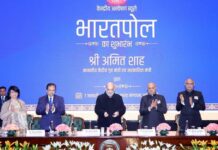By Our Correspondent
NEW DELHI/BHUBANESWAR/BARBIL: The studied silence maintained by the Union Mines, Coal and Parliamentary Affairs Minister, Prahallad Joshi and Union PNG-Steel Minister Dharmendra Pradhan on the proposed reforms on mining and coal sectors, which was seems intended to give a free hand to Sajjan Jindal and Naveen Jindal of JSW Steel and Jindal Steel and Power Limited, respectively, has raised many eyebrows in mineral bearing Odisha.
Sources close to Union PNG-Steel Minister Pradhan however informed that since a proposal is pending with the Prime Minister’s Office, it would be not wise to comment on it. “But it was very clear and laud, annualisation of payment of stamp duties and others dues of auctioned mines shall not be accepted,” sources in BJP said. They however argued, if any proposal, which was intended to create revenue and employment, should be accepted but if it was aimed to benefit certain people, opposition to it is very clear, they added. Despite several attempts, contacts were not made with Union Mines Minister Prahallad Joshi to get his reaction on proposed reforms in coal and mining sectors.
Sources said twin brothers Sajjan and Naveen have been playing their cards since the Prime Minister Narendra Modi led Government brought the MMDR Act 2015. Sources said, BJP keeping a soft corner on both Sajjan and Naveen to strengthen its bases in Haryana’s Hisar region, once represented by Naveen Jinadal in Lok Sabha. It may be noted here that many contributed to PM-CARES after the COVID-19 outbreak but JSW Steel and JSPL’s contribution of Rs 100 Crore and 25 Crores respectively to PM-CARES, was endorsed by the Prime Minister Modi and Union PNG-Steel Minister Pradhan, which speaks a lot about their proximity with the PMO as well as Mines and Steel Ministries headed by Joshi and Pradhan.
The proposed reforms in Coal and Mining sectors initiated by the Union Mines Ministry and annualization of payment of stamp duty instead of 1-time for auctioned mines, captive ,non-captive mines issues, which already hit the Tata Empires forcing TV Narendra to step down as President and the Steel maker’s exit from Indian Steel Association, is likely to open more Pandora box with sources hinting at a well planned conspiracy to siphoned off Odisha’s mineral resources to help out to India’s two leading Steel makers JSW Steel of Sajjan Jindal and Jindal Steel and Power Limited of Naveen Jindal.
The Union Mines Ministry’s suspicious move was seems intended to help Sajjan Jindal of JSW Steel and Naveen Jindal of JSPL. A quick look to the India’s MMDR Act of 2015 and Mineral Laws (Amendment) Bill-2020 followed by high premium mining auction in Odisha and now the proposed reforms by the Ministry, has opened the Pandora box, which will either promote a more big mining scam in eastern Indian State of Odisha or as well as put several State Governments and Union Government for a longer legal battle.
JSW Steel and JSPL have been desperately spreading their control over Odisha’s mineral resources. JSPL has multiple operations in Odisha while JSW Steel eyeing on debt ridden Bhushan Steel and Power Ltd and POSCO site at State’s Jagatsinghpur to expand its Steel and Mining business in Odisha.
JSW had won 4 major blocks earlier held by KJS Ahluwalia Group and Rungta Mines Ltd Group– Nuagaon (won on January 31),Narayanposhi ( won on February 2) and Ganua ( won on February 5) and Jajang ( won January 6) – with total ore reserve of 1,138.34 million tonnes. With the 4 Mines, an iron ore reserves linkage of more than 1,100 million tonnes has been secured for JSW Steel of Sajjan Jindal, sources in Barbil in Odisha’s Keonjhar said.
Naveen Jindal’s JSPL, which won Guali Iron Ore Block( won March 18-19) by 144 %, spreads over 365.026 hectares and has a reserve of 183 million tonne is located in five villages namely Guali, Panduliposi, Rugudihi, Laidapada and Topadihi under Barbil of Keonjhar, was earlier held by Jharkhand’s Chaibasa headquarters’ RP Sao and Sons. Apart from this, JSPL has also other running mines including stake at controversial Sarad Mines Pvt Ltd of Arjun Saraswat.
The last bidding for expired mines in Odisha fetched around Rs Rs 4.87 Lakh Crore revenue. These Mines blocks holds Iron Ore 1716.92 mt, Manganese 8.77 mt and Chrome Ore having 104.96 mt, which was worth Rs.4,87,082.55 Crore. Out of 23, 11 are in Keonjhar, 8 in Sundargarh ,3 in Jajpur and 1 in Mayurbhanj.
Auction for Badampahad block under Rairangpur circle under Mayurbhanj held by Lal Trade Agencies Pvt Ltd, a group Company of Ghanshyam Mishra and Sons owned by Kolkata based Jagadish Misra and Raj Kumar Mishra, which retained its Gorumahisani block, had been put on hold for court case.
It may be mentioned here that 6 Group companies of the Sajjan Jindal controlled JSW Group had vied for these block that rankled rival bidders , goading them to file written submissions with the Naveen Patnaik government, protesting the ambiguous terms of the tender documents. Given the contentious provisions and negative sentiment, Odisha Government had forced to bite the bullet and announce a sudden annulment of auctions on December 3, 2019 while the Enforcement Directorate had also earlier told the Appellate Bankruptcy Court that JSW Steel will not get immunity from the criminal charges being faced by Bhushan Power and Steel Ltd if it acquires the latter, because both are related parties.
On the other hand, JSPL was dragged into Supreme Court by the Naveen Patnaik Government for taking sub-lease of Sarad Mines Pvt Ltd owned by Kolkata based Arjun Saraswat, who has been designed as Nominated Owner and facing a penalty of sum of near about Rs 900 crore along with the lease holder SMPL for illegal mining and violation of Mines and Minerals Acts. JSPL has started transportation of minerals from Sarda Mines after paying fine amount in Supreme Court.
A week back, Bank of Baroda had extended financial assistance to JSW Steel “in the form of term loan for a sum not exceeding of INR 1294.65 crores and bank guarantee facility for a sum not exceeding INR 1000 crores for the purpose of financing the upfront payment obligations of JSW under the tender documents as a preferred bidder for acquisition of mining lease pertaining to Ganua Block for Iron Ore, the Jajang Block for Iron Ore, the Narayanposhi Block for Iron and manganese and the Nuagaon Block for Iron Ore, in Odisha”.
“The mining sector, which is a primary supplier of raw materials to the manufacturing and infrastructure sectors, is being considered to play a crucial role for the resurgence of the economy post the lockdown and in the coming years but if things will go in this way, more trouble days to come for this sector,” added a Koira , Sundargarh based Mines owner.
Another important issue the Ministry is contemplating is to annualise payment of stamp duty for auctioned mines, which will ultimately help JSW Steel and JSPL. Union Mines Ministry wants payment over the year instead of a single instalment of the net present value (NPV) for diversion of forests. If this implemented, mines owners will pay the taxes annually instead of one time. If this happens, both Sajjan Jindal and Naveen Jindal will have the last laugh as JSW Steel and JSPL are about to pay huge amount considering their blocks.
JSW Steel will have pay dues to Government for Nuagaon ,Narayanposhi,Ganua and Jajang blocks. Value of estimated reserves in INR Crores are as follows Nuagaon (Rs 1,85,683,47), Narayanposhi(Rs 42,571,12), Jajajng (Rs 5,511,44) and Ganua(Rs 24,982,79). This included 1% resource value, 0.5% affront payment and 0.5% performance security. For example, 1% security deposit for Nuagaon block will be around Rs 1856 Crore and NPV and stamp duty will be calculated extra. Naveen Jindal’s JSPL, which won Guali Iron Ore Block by 144 %, spreads over 365.026 hectares and has a reserve of 183 million tonne, too has to pay a huge amount to Government. Guali Block held by JSPL alone worth Rs.39,877.77 Crore. “Considering these above mentioned amount, the annunalisation of taxes and stamp duties will only help Sajjan Jindal and Naveen Jindal,” sources said in Bhubaneswar.
Average price of iron ore is about Rs 2000 per mt for calculation of affront payment and performance security but the Forest Department cleared that payment of NPV has to be paid before issuing vesting orders. Before the 50-year mining rights are granted, the lessees are to pay 0.5% of the value of the total reserve. A back-of-the-envelope calculation works out to Rs 2,400 crore. There was also a performance guarantee of the same amount that they were to submit. But lockdown was announced before this could happen.
On may 5, Assistant Inspector General of Forests, Sandeep Sharma in a letter bearing no F.NO.11-97/2018-FC-Part(1), has written to Secretary of Mines and States regarding guidelines under forest (Conservation) Act,1980, in pursuance of the Mineral Laws(Amendment Act, 2020) for payment of the NPV.
Sources said letters of intent (LoI) have been given to a few miners. Vesting orders extending environment and forest clearances by two years were due next. At this point, the new lessee will have to pay 10% of the ‘upfront payment’. Under the rules, a lease is to be granted within a maximum of 30 days of this order, before which the new lessee would also have to agree to the terms and conditions and a minimum production commitment.The payment of NPV, which the letter also suggests be allowed in installments, was to be charged at Rs 7.5 lakh a hectare and be paid to the environment ministry on receiving the letter of intent.
The Ministry of Mines plan to delete the 10A (2b and 2c) Sections from the Mines and Minerals Development Regulation (MMDR) Act and also mulling over removal of the definition of captive and non-captive mines aimed at providing a free hand to Jindal Brothers.
Sources said that the provision of section 10(A)2 B and C was inserted in MMDR Amendment Act 2015 to safe guard the interest of ML/PL holders whose cases were pending with different State Government at that time .
These applications were filed long back as per the prevalent act as applicable in that time. Due to crawling process of government machineries these applications could not be converted in to mining leases in time bound manner. When some massive changes took place on January 12, 2015, the interest of these cases were well safeguarded by bringing the provisions of 10 A2B and 2 C. Though there was a time limit of 2 years in case of 10 A 2C but no time line was fixed in case of 10 A 2B, they said.
Different state govt kept pending all cases of 10 A 2 B for almost 5 years and no conclusive decision was taken over these cases. Now by just one stroke of pen all these cases will be scraped.In these last 5 years, government kept a blindfold over these cases, which is why the cases couldn’t be processed timely. If Central govt didn’t want to allot these cases on mere royalty basis then why government kept these cases in saving clause under 10 A2 B in MMDR Act 2015.Those applicants have put lot of money, time and efforts to keep their respective cases alive and waited for almost 5 years after enactment of amended act, they argued.
Now government want to allot all these blocks through auction process ,as the recent auction held in Odisha fetched very attractive premium and this has completely changed the mind set of state and central government. The second case pertaining to early termination of validity of captive mines by 5 years. The captive mining leases coming under 8A5 category were extended by almost 15 years ie upto 31.03.2030 mainly belonging to Tatas . Now early termination of the captive mines and scraping the provisions of right of first refusal creates lot of doubt at this stage, one of the Koira , Sundargarh based Mines owner said .
Recently Some mega steel companies mainly rivals of TISCO , like JSW Steel, Jindal Steel and Power Ltd and few more have grabbed several big size iron ore mines in Odisha though auction .Now they are thinking that in future they may not be able to compete with Tisco ,because they have taken mines @ more than 100% premium whereas TISCO will enjoy it’s mines for another 10 years on simple royalty basis.That’s why they may not be able to compete with Tisco in long run, they said.
For instance suppose if the IBM price of 1MT of iron ore is Rs 3,000 pmt, the auctioneers have to pay 3,000 plus royalty etc.If cost of production will be added with this premium and royalty it will be around 4,500 pmt(3,000 amount of premium at 100%,) Rs 700 royalty DMF etc 800 tentative cost of production.). For 1 mt of iron ore the auctioned miners have to pay around Rs 4,500. On contrary TISCO will have to bear only Rs 1,500 towards royalty and cost of production, they said.
For making 1 mt of steel almost 2 mt of iron ore is required. Simply Rs 6,000 per mt extra cost will be borned by these auctioned miners for steel making where as TISCO having vast advantages of its infrastructures like Raliway siding and mining leases of coal,lime stone,Dolomite etc and less cost of production , long period in hand having extra edge over their competitors. In event of depressed market sentiments where the profit in steel will be less than 6,000 pmt even after Tisco can make some profit but their competitors will have to suffer the losses. Therefore these extra facilities of Tata has became a point of envy for their rivals. By hook or crook they don’t want to see TISCO to enjoy furthermore, sources added.
Section 10A (2) (b) allowed an entity to acquire a mining lease for the mines allotted prior to auction regime without any sunset clause and 10A (2) (c) allowed an entity to get the environment and forest clearance within 2 years of the auction of mines.
There is a proposal is to define illegal mining under the MMDR Act. In the past, like in the case of Coal India, violation of environment/forest clearance has led to the state government of Odisha seek fine in the tune of Rs 20,000 crore in 2017 including around Rs 900 crore of Jindal Steel and Power Ltd and Sarda Mines Pvt Ltd over violation of Rule 37 and others acts. The amendment will clarify that mining within the mining lease area cannot be illegal under Section 21 (5) of the MMDR Act,
The Ministry had reportedly suggested bringing in early termination of captive leases from 2030 to 2025 and auction such mines without any first right of refusal. Another bold move that is being considered is that of transferring mines seamlessly whether it has been auctioned or allotted by the government. Under the current norms, only auctioned mines can be transferred and for non-captive mines, a transfer charge is levied equivalent to 80 percent royalty.
The resignation of TV Narendra, as President of Indian Steel Association, was an outcome of Tata Group’s concerns over captive and non-captive mines issues in the wake of media reports on mining and coal sectors facing reforms soon, sources said. TV Narendra is chief executive and managing director of Tata Steel. Earlier, several Gold mines owners in Karnataka had expressed their concerns on issues of 10A (2b and 2c) Sections from the Mines and Minerals Development Regulation (MMDR) Act as they feared huge loss since they invested crores in explorations in past 15 years and an open auction for the same gold bearing block, would put them in trouble.
Narendran was the President of the Association, which has representation from leading steel producers including JSW Steel, SAIL, Rashtriya Ispat Nigam, Jindal Steel and Power, Bhushan Power and Steel, Tata Steel BSL and ArcelorMittal. His two-year tenure was to end in August. Tata Steel has large captive mines spread across Jharkhand and Odisha feeding its plants at Jamshedpur, Kalinganagar and Angul. It also mines ferro alloys such as chromite and manganese for captive use.In FY19, the company mined 23.3 million tonnes of iron ore and 6.54 million tonnes of coal, meeting 100 per cent and 27 per cent of its requirements, respectively.
The FICCI had however while supporting the move, welcomed the proposed reforms in coal and mining sector by saying these measures will give a push towards government’s efforts for improving efficiencies in coal sector for augmenting domestic coal production and reducing the cost of power for the consumers. These measures will also help the government pursue its objective of attaining sustainable development growth plans, Vipul Tuli, FICCI Power Committee Chairman, had said soon after media reports.
The ministry had also suggested that no mine should be auctioned as captive in future, doing away with the distinction between captive and merchant altogether. The auctions of iron ore and manganese mines in Odisha in January and February fetched an average premium of about 105%. That means, in addition to taxes and cess, a lessee would also pay the state Rs 105 for every Rs 100 of ore it sold over the next fifty years. Taking prevalent iron ore prices and everything else as constant, this works out to an additional annual revenue of about Rs 7,000 crore for the state, a report in The Economic Times said.
The 2015 amendment made two exceptions: Under Section 10A (2b) where reconnaissance or prospecting had been carried out successfully, the lessee could move up to a prospecting or mining lease respectively. Ironically, subsection 2c offered a window of two years, or until January 12, 2017, to those that had progressed beyond and held a letter of intent.
Royalty is charged on price inclusive of royalty because miners pass on the cost anyway. Any discounting of this would lead to a loss of revenue for the state. New lessees have offered premiums of five to six times of royalty presumably because they could afford to.
Auctioning of additional blocks, reduction in cost of mining and transportation, increasing ease of doing business, participation of private sector in exploration and mining and use of sea-routes for domestic supplies will be some of the next wave of reforms being planned by the Government for bringing in more investments, increasing employment opportunities and towards substituting imported coal with inventory of domestic coal with an objective of securing the country’s energy needs, he added.
Under these 2 provisions of MMDR Act, about 600 mines are stuck and the idea is to get these mines for auction. The ministry also intends to return mines held with PSUs for more than 3 years where mining is yet to begin and other non-operational mines to the state government for auction.
The tax burden has been at a higher range in India for mining, the ministry intends to simplify royalty calculation and plans to bring an amendment to the Act. The amendment will allow calculation of royalty which will exclude taxes and levies.Discussion is also being held with the finance ministry on levy of the stamp duty in a calibrated manner instead of the entire lease period of 50 years at one go. All levies and royalty are calculated on the average sale price which ministry believes, is not the actual representative of actual mineral price and hence it plans to bring a national mineral index.
In the coal sector, the ministry had already enabled the provision for auction of coal mines for commercial sale but final rules for the auction are yet to be formulated as COVID-19 delayed the beginning of the auction process starting April 2020. The ministry is also looking at including a revenue-sharing model for auction of coal to boost production, enable single-window clearances, and reduce dependence on imported coal.The focus of the government is to bring big reforms in the coal and mining sector to kickstart the economy which has been majorly impacted due to a long spell of lockdown on account of coronavirus spread.
Sources said that Ministry of Mines is looking at doubling employment from the current one crore to two crore and even double GDP contribution from Rs 4.1 lakh crore to Rs 8 lakh crore by 2024. The ministry has mooted for pre-embedded clearances for successful bidders as it requires 20 statutory clearances which take 2-3 years to obtain. The proposal is for the states to obtain clearances prior to the auction which will be transferred to the winning bidder. The ministry is already monitoring pilot projects in four states where mines are auctioned with pre-embedded clearances.






















